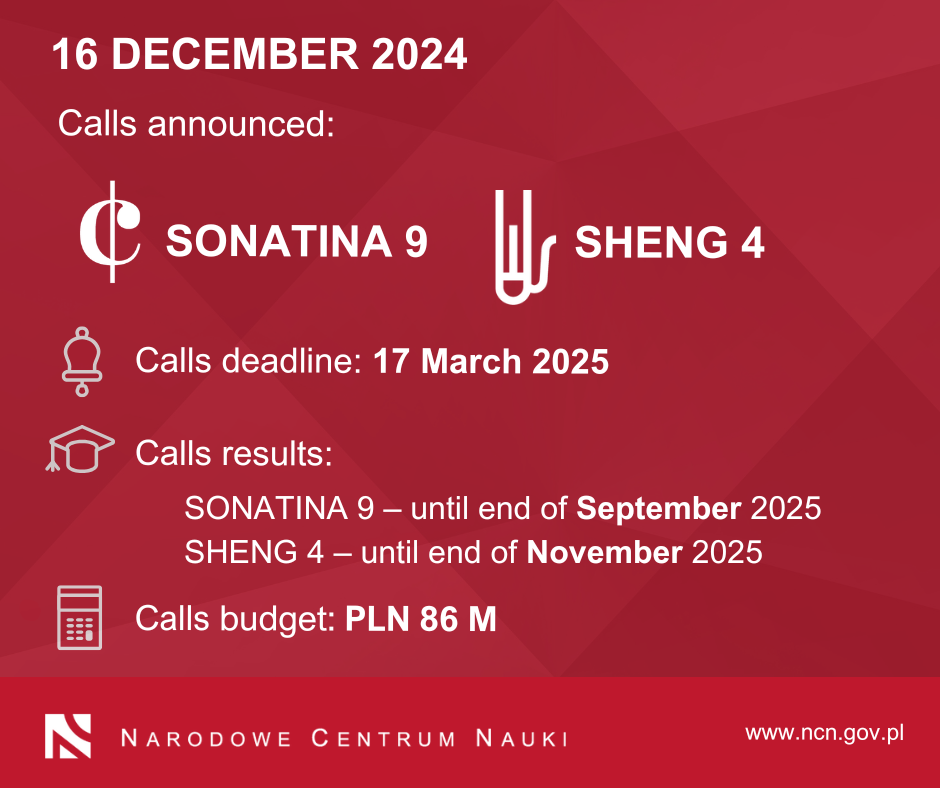Proposals are now being accepted under SONATINA 9 and SHENG 4, which are open, respectively, to researchers within 3 years of earning their PhD and Polish teams working with Chinese partners. The total budget of the two calls equals PLN 86 million.
We are happy to announce the 9th SONATINA call for young researchers. In order to apply, the project’s PI must hold a PhD awarded between 1 January 2022 and 31 December 2024, or expect to earn the degree by the end of June 2025. The SONATINA grant provides the funds necessary to cover all project expenses and secure the full-time employment of the PI at a Polish research centre. The PIs are also required to plan and complete a fellowship at a renowned foreign research centre of their choice.
 The SHENG call for bilateral international research proposals is organised for the fourth time. This time, funding is available to Polish teams working in cooperation with Chinese partners on basic research projects in any discipline of life sciences (NZ1-NZ9), selected disciplines of art, humanities and social sciences (panels: HS6_01-HS6_08, HS6_14-HS6_15 covering research on human nature and human society), and selected disciplines of physical sciences and engineering (ST4: chemistry, ST5: computer science and information technologies, ST8: production and process engineering, and ST11: materials engineering). Grants under SHENG 3 can go toward funding research tasks, salaries for research team members, scholarships for graduate students and PhD candidates, research equipment and other necessary expenses of the Polish team. The SHENG call is organised jointly by the National Science Centre and the National Natural Science Foundation of China (NSFC).
The SHENG call for bilateral international research proposals is organised for the fourth time. This time, funding is available to Polish teams working in cooperation with Chinese partners on basic research projects in any discipline of life sciences (NZ1-NZ9), selected disciplines of art, humanities and social sciences (panels: HS6_01-HS6_08, HS6_14-HS6_15 covering research on human nature and human society), and selected disciplines of physical sciences and engineering (ST4: chemistry, ST5: computer science and information technologies, ST8: production and process engineering, and ST11: materials engineering). Grants under SHENG 3 can go toward funding research tasks, salaries for research team members, scholarships for graduate students and PhD candidates, research equipment and other necessary expenses of the Polish team. The SHENG call is organised jointly by the National Science Centre and the National Natural Science Foundation of China (NSFC).
Budget
The budget of SONATINA 9 is PLN 40 million, up by 100% from the previous edition of the call. The total funding available to Polish research teams under SHENG 4 has also reached a record level: 46 million, a threefold increase over SHENG 3, announced exactly two years ago, which had a budget of just PLN 15 million. These unprecedented levels of funding are possible because of a recent increase in the NCN budget.
Peer review and results
Proposals submitted under SONATINA and SHENG are evaluated by expert teams appointed by the NCN Council under three panels: HS (art, humanities and social sciences), ST (physical sciences and engineering), and NZ (life sciences). The review process consists of two stages. At stage 1, team members prepare independent reviews for each proposal and decide on their final scores together during a panel session. At stage 2, the proposals are submitted for review by external experts, i.e. scientists from around the world who specialise in the specific research field covered by each proposal. In addition, under SONATINA, the PIs are invited to an interview at the NCN offices; their final scores and rankings are then decided at the second panel meeting. Under SHENG 4, proposals are evaluated in parallel by the NCN and the NSFC, and grants are awarded only to projects recommended for funding by both agencies until the budget of the call is exhausted.
The results of the SONATINA call will be announced by September 2025 and for SHENG by the end of November 2025 at the latest.
New NCN panel list
The winter round of NCN call announcements is also accompanied by a modified list of panels under which proposals will be submitted and evaluated, the first such sweeping change in years. The changes were approved by the NCN Council in September, following many months of debates and consultations with the Polish research community. They are meant to align the NCN panel list more closely with that in use at the European Research Council and with the actual realities of research in our country. More information.
To date, in all concluded SONATINA calls, a total of nearly PLN 234 million in funding for research projects and fellowships have been awarded to 325 young researchers. In the previous three SHENG calls, grants have gone to 61 projects, with a total budget of PLN 78.9 million awarded to Polish teams.
